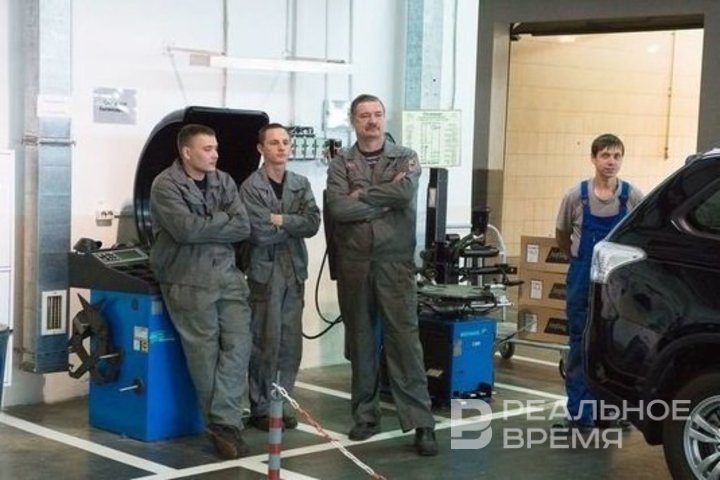What the flood of counterfeit spare parts meant for Tatarstan car owners
The shortage of original spare parts for repairs has created problems on both sides of the auto repair shop market

Analysts have noted the influx of counterfeits on the auto parts market comparing the situation with the events of 17 years ago when a powerful flow of counterfeit goods first poured into Russia. According to the results of a survey by Gruzdev Analyze agency, this has become a serious problem for 40% of auto repair shops, while in 2023, counterfeits were a headache for no more than 20% of respondents. At the same time, the fact that counterfeits are often offered for sale at the price of originals is of particular concern, and it has become almost impossible to determine the authenticity of a part by its price. Realnoe Vremya found out how acute the issue of counterfeit auto parts is in Tatarstan, how it affects local businesses, and how the problem of car repair can be solved in these conditions for a lower price.
“There are no more original parts”
“Kazan suppliers do not have original parts for European and American foreign cars — there are none in Russia at all now,” admitted owner of one of the Kazan car repair shops and sole trader Rinat Sagitov.
“They can be ordered directly from Europe, but my company does not do this because there are simply not enough repairs to buy original parts in batches, otherwise you can't buy them. And my clients are usually not ready to wait several months for a branded part. Therefore, we try to use high-quality analogues. And our main problem now is that the quality of these analogues has dropped significantly, there are too many fakes on this market,” he said.
According to Sagitov, his company is getting out of the situation thanks to established connections with a trusted supplier, but at the same time it still suffers both financial and reputational losses. The company does not accept cars with customer supplied parts for repair, but works only on the condition that its own parts are used, which are more expensive for customers than those that can be bought, say, on marketplaces. But parts from a trusted supplier can also be of poor quality. The only advantage is that the supplier provides a guarantee for them and meekly replaces them in the event of a breakdown. But the volume of returns is shocking.

“For example, we return 7-8 out of 10 steering racks, and they are replaced for us,” the entrepreneur explained. “However, when replacing under warranty, we bear the cost of repairs because the double work of the craftsmen is not paid. Well, such situations do not have the best effect on the reputation of our service station, although it is not our fault.”
“The problem is not new”
Farid Zaripov, the head of the AvtoZilCenter chain that specialises in the supply and repair of trucks, disagreed with his colleague:
“The problem of non-original and counterfeit spare parts is not new, it appeared a long time ago, so I cannot say that there is some special boom in counterfeits now. Well, maybe the issue has become a little more acute, but not so much as to talk about something out of the ordinary. China began to counterfeit spare parts on a global scale a long time ago, but here we are talking, rather, not about counterfeit, but about spare parts, as they say, no name. And we repair with Chinese spare parts, since there is no choice.”
In addition, Chinese spare parts, according to Zaripov, have become much better quality in recent years, and in the absence of good Russian ones, they compensate for the shortage of originals, and are sold at an adequate price corresponding to the quality.

The interlocutor of Realnoe Vremya also refuted the assertion that auto repair shops today manage to make money only on mark-ups on spare parts:
“Mechanists are very well paid today, we recently had an excellent specialist leave a salary of 120,000 rubles because he was offered an easier option for the same money. That's the situation with personnel. But, frankly speaking, we don't give them everything, we keep something for ourselves.”
“The flow of counterfeit spare parts has fallen by 10%”

According to Kazachenko, auto parts are not counterfeited or almost not counterfeited for one simple reason: if oil can be made up without much expense, so to speak, in a rusty barrel in a barn, then the cost of a counterfeit auto part is higher than the cost of a non-original one imported from China. Because the production of spare parts requires conditions, equipment, and specialists. And the process can only be made cheaper by putting it on stream, which is being done quite successfully in China.
“Today, some manufacturers import spare parts 10-15% cheaper than before,” says the vice president of the Automobile Service Association. “It is profitable to produce counterfeit goods if, for example, they made a canister of oil of a well-known brand, sold for 7-9,000 rubles, and the cost of its production is 550 rubles. But making some suspension part, or pads, or something else is very expensive, so there is simply no point in making them. But if we analyse the cost, for example, of brake pads that are officially produced here, the so-called STM production — contract manufacturing of goods under our own brand, then, for example, brake pads for Mercedes will cost 3-3,500 rubles in our production, and they can be brought from China for 1,900, and this will not be considered a fake, and the quality will be normal. The Chinese today honestly write that this is not the original.”
When asked how dangerous it is today to use non-original spare parts, Kazachenko answered: not dangerous at all. And he explained that car factories do not produce many elements and parts, but order them from others, the same Chinese manufacturers, but then put their own label on them — and the price for them rises by 200%. In addition, according to him, a non-original no name part can last a little less because it is made according to less stringent technical conditions:
“Well, your block will not last 40,000 kilometres, but will last 25-30,000 — this is not fundamental. And sometimes the cost is exactly the same as the original, no name parts on the marketplace can differ by 70% from those packed in the original box.”
According to him, auto parts are imported to Russia by several large suppliers in large batches, and then these batches are distributed to services, marketplaces, online stores, and so on. And prices differ everywhere depending on many factors, including the degree of greed of sellers. But when asked whether an ordinary motorist should go to a marketplace for the cheapest option in order to save money or whether it is better to overpay the workshop for a guarantee, Kazachenko firmly answered that it is better to “surrender” to the hands of the masters. Because if something happens later, the issue of replacing parts will be resolved under warranty.
“The main thing is safety”

Marketplaces, according to him, are literally littered with tools and spare parts at a variety of prices, the same model can cost 2,000 rubles, 3,000 and 15,000: “And they write good reviews about fakes, and some people understand that it is a fake, but they are happy with it — it works ... A strange situation has even developed from my point of view, in the search of some marketplaces you can set the condition “only original goods,” that is, the seller does not hide that he sells a fake, and this condition should be read like this: “Only legal goods.”
Glukhov noted that dealers who sell truly legitimate, original products are forced to leave the market under these conditions, since they cannot compete with the huge number of fakes. He added that the situation with original auto parts has always been quite tense, but the biggest problem was and remains the counterfeiting of oils and technical fluids. And this is really dangerous, because if you fill up with a fake, you can end up simply breaking your car.

In his opinion, the problem of counterfeit auto parts is less acute, but there are still big risks here:
“Dealers used to teach us that only originals are the best. They had posters, special testers, showing the difference. And suddenly, 2-3 years ago, everything changed. Large dealers, including those in Kazan, offer some little-known brands and, judging by their own reviews, buy lots of spare parts at their own risk. As a result, car repair turns into a lottery. And those things that are related to safety — maintenance of the brake system, heating equipment, etc. — should still be serviced as well as possible, and I see only one way out for the consumer — to try to be in the flow. That is, if everyone now takes some one type of spare parts or orders it in one place, then it is advisable to buy together with them, in the hope that the law of large numbers should work. It is also important to remember that the chance to buy something decent 2-3 times lower than the market price tends to zero.”
Counterfeits are not cheaper than originals

According to her, counterfeit goods for foreign cars that were previously sold in good quantities in Russia are actively imported — Toyota, Hyundai, KIA, consumables for the well-known Mann Filter, Denso, etc., Shell, Castrol, Mobil oils, car chemicals and much more. At the same time, counterfeits are not always significantly cheaper than the originals, since their suppliers understand that a very low price will alert buyers.
The director of NAPI noted that at present there is no acute shortage of auto parts, and to save money you can always buy not an original spare part, but its analogue.
“Such spare parts as brake pads, bumpers, headlights, filters, windshields for Russian, Chinese cars and mass-produced foreign cars are widely available in Russia,” said Tatyana Arabadzhi. “The most difficult thing is to find original body parts for foreign cars, as well as complex units (cylinder heads, transmission units, etc.) or parts for rare cars, which were previously sold in Russia in small quantities.”
The main danger of counterfeit goods, she emphasised, is a decrease in the safety of the car both for the car owner and for other road users. And she noted that breakdowns and failure of an expensive unit due to the use of low-quality counterfeit spare parts also hit the pockets of overly “thrifty” car owners, since they lead to large financial costs for subsequent repairs.